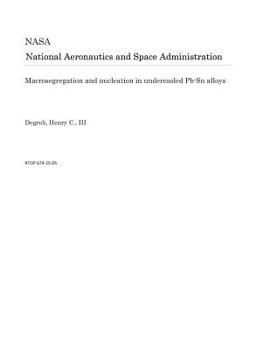Macrosegregation and nucleation in undercooled Pb-Sn alloys
A technique resulting in large undercoolings in bulk samples (23g) of lead-tin alloys was developed. Samples of Pb-12.5 wt percent Sn, Pb-61 wt percent Sn, and Pb-77 wt percent Sn were processed with undercoolings ranging from 4 to 34 K and with cooling rates varying between 0.04 and 4 K/sec. The nucleation behavior of the Pb-Sn system was found to be nonreciprocal. The solid Sn phase effectively nucleated the Pb phase of the eutectic; however, large undercoolings developed in Sn-rich eutectic liquid in the presence of the solid Pb phase. This phenomenon is believed to be mainly the result of differences in interfacial energies between solid Sn-eutectic liquid, and solid Pb-eutectic liquid rather than lattice misfit between Pb and Sn. Large amounts of segregation developed in the highly undercooled eutectic ingots. This macrosegregation was found to increase as undercooling increases. Macrosegregation in these undercooled eutectic alloys was found to be primarily due to a sink/float mechanism and the nucleation behavior of the alloy. Lead-rich dendrites are the primary phase in the undercooled eutectic system. These dendrites grow rapidly into the undercooled bath and soon break apart due to recalescence and Sn enrichment of the liquid. These fragmented Pb dendrites are then free to settle to the bottom portion of the ingot causing the macrosegregation observed in this study. A eutectic Pb-Sn alloy undercooled 20 K and cooled at 4 K/sec had a composition of about Pb-72 wt percent Sn at the top and 55 percent Sn at the bottom. Degroh, Henry C., III Glenn Research Center RTOP 674-25-05...
Format:Paperback
Language:English
ISBN:1729010156
ISBN13:9781729010150
Release Date:January 1
Publisher:Independently Published
Length:38 Pages
Weight:0.25 lbs.
Dimensions:0.1" x 8.5" x 11.0"
Customer Reviews
0 rating





